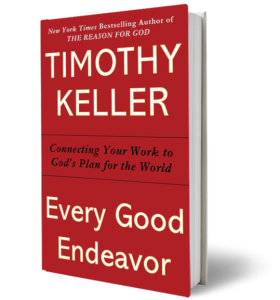 Tim Keller’s Every Good Endeavor has been on my nightstand to-read stack since it came out.
Tim Keller’s Every Good Endeavor has been on my nightstand to-read stack since it came out.
Enter Andrew Wise with this handy Executive Summary. Andrew just graduated from The Southern Baptist Theological Seminary and was an intern with us with Cru for two years. His professional opinion on the book:
“this should be required reading for every college freshman/sophomore”
While I still plan to read the book…in the meantime this is a helpful, well organized overview of the book, chapter by chapter.
Some highlights:
“Our work can only be a calling if it is reimagined as a mission of service to something beyond merely our own interests”
If this life is all there is… everyone will be forgotten, nothing we do will make any difference, and all good endeavors, even the best, will come to naught…Unless there is God. If the God of the Bible exists, and there is a True Reality beneath this one, and this life is not the only life, then every good endeavor, even the simplest ones, pursued in response to God’s calling, can matter forever.
Without meaningful work we sense significant loss and emptiness…Work is one of the ways we make ourselves useful to others and discover our identities.
Work of all kinds, whether with hands or minds, evidences our dignity as human beings because it reflects the image of God the Creator in us.
Choosing Work: “How, with my existing abilities and opportunities, can I be of greatest service to other people, knowing what I do of God’s will and human need.
Since we already have in Christ the things other people work for, salvation, self-worth, a good conscience, and peace — now we may work simply to love God and our neighbors.
If you have to choose between work that benefits more people and work that pays you more, you should seriously consider the job that pays less and helps more — particularly if you can be great at it.
All work is objectively valuable, but it will not be subjectively fulfilling unless you see it as a calling to love your neighbor.
Today young people are seeking to define themselves by the status of their work. It is a major identity marker.
-
- Many college students do not choose work that actually fits their abilities, talents, and capacities, but rather choose work that fits within their limited imagination of how they can boost their own self-image.
- Three kinds of jobs they see — those that pay well, those that directly serve society’s needs, and the cool factor.
- Results in students choosing work that doesn’t fit them or fields too competitive for them. Sets them up for dissatisfaction / meaninglessness.
If we have the luxury of options, we should choose work that we can do well — what’s something you can excel at?